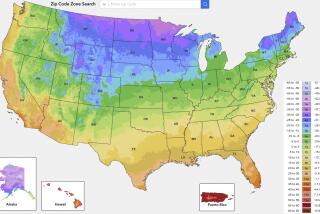Even in Dead of Winter, Crops Thrive in Maine
- Share via
FREEPORT, Maine — A carpet of snow covers the Laughing Stock Farm and the ground is frozen four feet deep. But, unlike most farmers, Lisa Turner has not hibernated for the winter.
The temperature drops to 13.5 degrees on a typical February day, but that doesn’t stop Turner from heading out each morning to tend her tiny salad-mix plants in unheated greenhouses.
She is among a few Maine farmers who have begun cultivating their crops in the dead of winter without the benefit of heaters to coax their greenhouse plants along. The technique relies on natural sunlight, careful planning and plastic layers to insulate the plants.
It takes about twice as long for the plants to reach maturity in the winter than in the summer, but Turner has managed to harvest hundreds of pounds of salad mix since November.
Two of her three greenhouses are unheated, and the temperature dips to freezing at night. But the temperature reached 67 degrees inside the greenhouses on a recent sunny day.
Turner started winter farming after being intrigued by the success of Eliot Coleman and Barbara Damrosch, a husband-and-wife team who are so successful with their winter harvest--greens, root vegetables, peas and scallions, to name a few--that they have given up summer growing at their farm in Brooksville.
Coleman has been experimenting with winter cultivation for two decades and has transformed his Four Seasons Farm into a successful winter operation over the last five years. Everything Coleman and his wife grow is sold to nearby restaurants and markets.
Despite bordering Canada, Maine gets the same amount of light as the Mediterranean. In fact, the cold Atlantic waters off Portland are at the same latitude as the beaches of St. Tropez.
“We have as much sun. They just have the Mediterranean and the Gulf Stream making their winters, on average, 25 degrees warmer. We make up those 25 degrees with two layers of plastic,” he says.
So, despite the snow clinging to the sides of Turner’s Freeport greenhouses, a different microclimate lies under the plastic blanket covering the plants for much of the day. The covering enables hardy winter vegetables to withstand freezing temperatures overnight.
The technique doesn’t work with warm weather plants like tomatoes, but Coleman and Damrosch say it makes more sense to eat with the seasons anyway. Carrots are sweeter when grown in the cold months and arugula loses the bite it has when grown in the warmer months, Damrosch says.
“Why eat things that taste like cardboard when you can eat things that are meant to grow in the winter and taste magnificent?” Coleman asks.
Coleman and Damrosch hope farms like theirs sprout up across the state. Their ideas do seem to be catching on in Bath, Belfast, Brooks and Lisbon Falls.
That the trend seems to be concentrated around the coast is a coincidence, said Eric Sideman, staff scientist of the Maine Organic Farmers and Gardeners Assn. He said the success of the technique doesn’t rely on the coastal climate, but the location of those farms do offer a different kind of advantage.
“You need an affluent market to sell it to and, in Maine, the affluent market is along the coast,” he said.
Ellie MacDougall, owner of Blue Sky Farm in Wells, grows herbs in her unheated greenhouses. She says the techniques have extended her growing season and have allowed her to raise some plants that would not normally survive in Maine. Rosemary in her greenhouse blooms in March, just as in the south of France, she says.
“I’ve also been able to grow bay in there, little bay trees. And those certainly shouldn’t be able to grow here. You see them in the Middle East,” she says.
Russell Libby, executive director of the Maine Organic Farmers and Gardeners Assn., says people have been experimenting with winter cultivation since the late 1970s.
Most of the people trying Coleman’s techniques seem to be concentrated in Maine’s active organic farming community, but it looks like word could spread.
Since this is the first year that Turner has tried commercial winter farming and she had a lot of initial expenses on the greenhouses, she doesn’t expect to see a profit.
“I’d love to say I’m making a fortune from it, but there are a lot of bugs that need to be worked out,” she says. Nonetheless, Turner thinks she will probably put up more greenhouses next year: “I have faith in what’s going on.”
More to Read
Sign up for Essential California
The most important California stories and recommendations in your inbox every morning.
You may occasionally receive promotional content from the Los Angeles Times.













